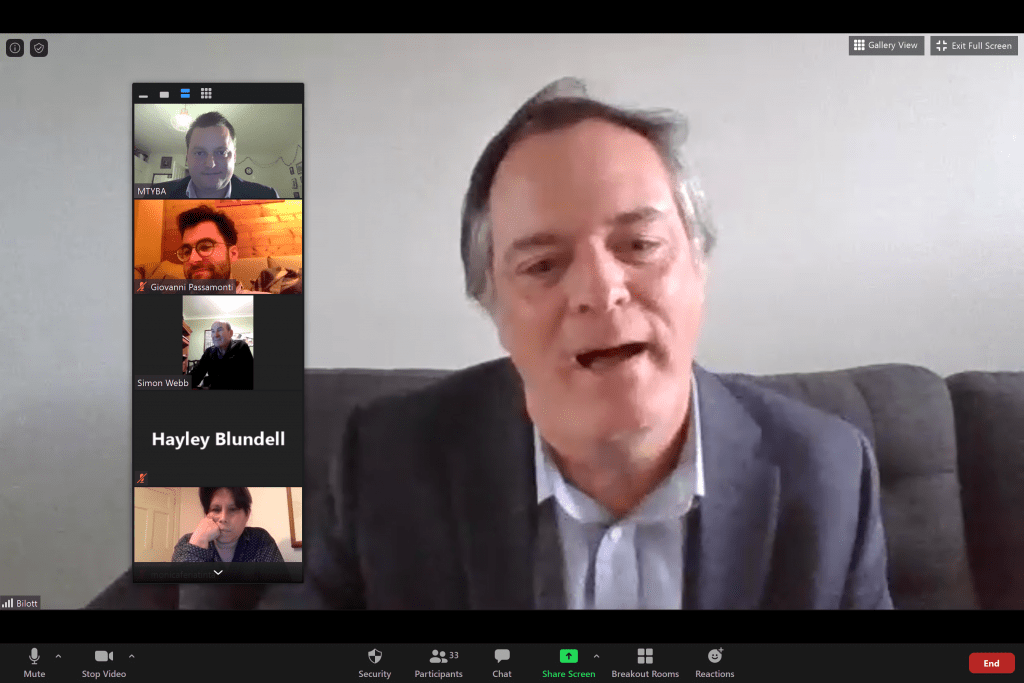
Hayley is the secretary of MTYBA. She works for King’s College London in their legal clinic whilst she seeks pupillage. Previously she worked for Support Through Court at the Royal Courts of Justice. She studied Law with Open University after 12 years of community work in the North.
We all have a tendency to disbelieve the bizarre. Having worked with litigants in person for three years during and after the Bar Professional Training Course (BPTC), I developed a thick skin and slowly, without realising it, forgot the reason I wanted to become a barrister: to help people through their difficult legal situations. It was not until a recent Middle Temple Young Barristers’ Association (MTYBA) event I realised I had become removed.
During lockdown MTYBA has been continuing to host events to encourage and inspire junior members. On Friday 15 May 2020, fresh from a week of working from home and, ironically months of household discussions on which cookware to purchase (watch the film), we sat down as a house to join MTYBA in watching Dark Waters; a film based on the real life story of Robert Bilott, who, as a lawyer, spent 20 years fighting against DuPont, a chemical company, for poisoning the water supply of Parksberg in West Virginia. After the film we had the privilege of having Mr Bilott join us for a Q&A session where he shared his experiences and updated us on what is happening now with the cases. I will try not to ruin the film for those of you who are yet to see it but there were several ‘lawyer life lessons’ I would love to share.
Within the first few minutes of the film we are introduced to Mr Bilott (played by Mark Ruffalo) who is making his living from defending chemical companies. We are also introduced to Wilbur Earl Tennant; he is hard to understand and explains he believes a big chemical company is responsible for the death of his cows. Mr Bilott responds, as many of us would, with ‘thank you for coming to see me but I cannot take on your case, good luck’. After all, Mr Bilott’s firm, we learnt from the live Q&A afterwards, did not take on plaintiff’s cases, they were a defence firm.
Mr Tennant’s next line is one of many throughout the film which hit me right in the heart: ‘I don’t need luck. I need your help’. He also alluded to Mr Bilott being just like the rest of the lawyers he had already contacted – ‘too yellow to take on the case’.
Speaking to the real Robert Bilott afterwards and hearing his response to the question: ‘What advice would you give to young lawyers who have a client turn up on their doorstep, who says all other lawyers are too yellow to take this case?’ was illuminating. He spoke of the need to trust your gut, to take risks based on your instincts and risks that you could live with, as you never know what will happen over the coming 20 years.

Mr Bilott explained to us during the Q&A that media interest surrounding this case has always been low. An image that will stick with me is a little later in the film when Mr Bilott has decided to take on Mr Tennant’s case. You see a sign of the level of corruption and power big companies have over the world we live in. Mr Tennant goes to his local diner for his ‘usual’ and is greeted with coldness. He sees an article: ‘Disgruntled farmer sues city’s biggest employer’ in a paper laid on the table. Of course, the press are independent investigators of truth and can never be bought.
The defence firm Taft Stettinius & Hollister obviously struggled to understand why Mr Bilott would throw away his career in order to represent the plaintiff. Mr Bilott shared with us how difficult this time had been for him and how clients just stopped calling. One of Mr Bilott’s supporters, during a partners’ meeting, where the continuing support of the case is being discussed, displays frustration at those who refuse to read the facts of the case before passing judgement. The line: ‘Read it and then tell me if we should be sitting on our asses, it’s no wonder the American people don’t trust lawyers’, is another one of those lines which connects on an emotional level.
Something I had not considered was discussed in the Q&A; at the time Mr Bilott was asking for his firm’s financial backing, the 2008 recession was hitting hard. I guess what Mr Bilott was asking is the equivalent of asking right now, amidst the Covid-19 lockdown, for backing of £10 million for a case that, on the face of it, seems unwinnable and could cause serious reputational damage for chambers. Mr Bilott’s career displays his deep integrity and fight for the truth to be known by all. These characteristics were also displayed clearly by his firm and the plaintiff’s in these cases, who appeared to be far more interested in the truth and justice than in any pay out of damages.
Some of the scenes throughout the film, were incredibly uncomfortable to watch as an aspiring female barrister. Specifically, the scenes where women lawyers were outlining how they would have to keep pregnancy a secret from the firm’s partners ‘as long as possible’ and even seeing that Mr Bilott’s own wife never returned to her career as a lawyer after mothering three boys. However, my favourite line in the whole film comes from Mrs Bilott. Mr Bilott has just suffered a stress induced health scare and is in hospital. Mrs Bilott is making sure his boss is aware that his lack of belief in her husband has made him feel like a failure and is a contributing factor to his ill health. I conclude with her line which displays the real heart of this film and the Bilott’s story, thus far: ‘Risking everything you have to help someone is not failure’.

